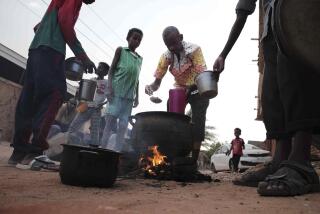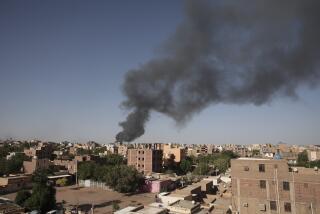2 U.S. Troops, 17 Iraqis Killed
BAGHDAD — Two U.S. soldiers were killed in Iraq on Friday, raising the American military death toll to 841 so far this year -- five fatalities short of the 2004 toll despite political progress and efforts to quash the insurgency.
Violence continued unabated Friday, with at least 17 Iraqis killed in shootings and mortar attacks around the country and a suicide car bombing in Baghdad. In the most serious incident, police said nine people were killed in a drive-by shooting, apparently because they were drinking alcohol in public.
A senior Sudanese diplomat said his country had closed its embassy in Baghdad in an effort to gain the release of six kidnapped employees, including a diplomat.
“A statement was issued by the Sudanese government to close the embassy in Iraq to win the release of our kidnapped citizens,” Charge D’affaires Mohammed Ahmed Khalil told Associated Press. The embassy’s 12 employees plan to leave Monday.
Al Qaeda in Iraq on Thursday threatened to kill five Sudanese today unless the diplomatic mission was removed from Iraq.
The Sudanese Foreign Ministry reported Dec. 24 that six of its embassy employees had been kidnapped, including the mission’s second secretary, Abdel Moneam Mohammed Tom. It was not clear whether the Al Qaeda statement was referring to the same group.
The American military announced the two new deaths Friday. A bomb killed one soldier Friday when it struck his vehicle in Baghdad; the second soldier was shot in the restive western city of Fallouja.
Their deaths brought the number of U.S. military personnel killed in December to 64. The worst month of the year was January, with 106 fatalities, followed by November with 96 and August with 85.
The United States hopes that as more Iraqi police and troops are trained, they will slowly take over responsibility for security from American troops.
Much of that expectation hinges on the ability of Iraq’s ethnic and sectarian groups to work together to form a broad-based government with sufficient legitimacy to deflate the insurgency, which is driven by Sunni Muslim Arabs.
In Baiji, north of Baghdad and near Saddam Hussein’s hometown of Tikrit, the deteriorating security situation led authorities to shut down Iraq’s largest oil refinery Dec. 18, former Oil Minister Ibrahim Bahr Uloum told AP. Uloum said the facility was “considered one of the vital refineries in Iraq” and produced about 2 million gallons of gasoline a day.
As word of the shutdown spread through the country, about 1,000 vehicles waited at one of Baghdad’s biggest gas stations, known as the Jindi Majhoul, or Unknown Soldier, station.
Ahmed Khalaf said he left his home at dawn and was still in line at noon.
More to Read
Sign up for Essential California
The most important California stories and recommendations in your inbox every morning.
You may occasionally receive promotional content from the Los Angeles Times.










